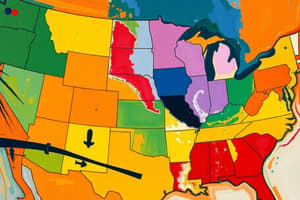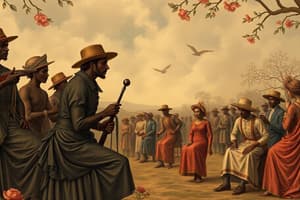Podcast
Questions and Answers
What was the main purpose of the Missouri Compromise?
What was the main purpose of the Missouri Compromise?
To prohibit slavery in all federal territories north of a specific line above Missouri.
What role did popular sovereignty play in the Compromise of 1850?
What role did popular sovereignty play in the Compromise of 1850?
It allowed residents of New Mexico and Utah territories to decide whether to permit slavery when applying for statehood.
What was the significance of the Fugitive Slave Act?
What was the significance of the Fugitive Slave Act?
It mandated that escaped slaves must be returned to their owners, even if found in free states.
How did Personal Liberty Laws affect the Fugitive Slave Act?
How did Personal Liberty Laws affect the Fugitive Slave Act?
What event is referred to as 'Bleeding Kansas'?
What event is referred to as 'Bleeding Kansas'?
What was John Brown's objective during his raid at Harper’s Ferry?
What was John Brown's objective during his raid at Harper’s Ferry?
What was President James Buchanan's approach to the issue of slavery?
What was President James Buchanan's approach to the issue of slavery?
What was Henry Clay's role in the compromises regarding slavery?
What was Henry Clay's role in the compromises regarding slavery?
What role did Stephen Douglas play in the context of popular sovereignty and his relationship with Abraham Lincoln?
What role did Stephen Douglas play in the context of popular sovereignty and his relationship with Abraham Lincoln?
What significant publication did William Lloyd Garrison create, and what was its impact on the abolitionist movement?
What significant publication did William Lloyd Garrison create, and what was its impact on the abolitionist movement?
How did Dred Scott's case influence public opinion about slavery and legal rights for enslaved people?
How did Dred Scott's case influence public opinion about slavery and legal rights for enslaved people?
What was the significance of Bleeding Kansas in the context of the Kansas-Nebraska Act and sectional tensions?
What was the significance of Bleeding Kansas in the context of the Kansas-Nebraska Act and sectional tensions?
What were the intentions behind John Brown's raid on Harpers Ferry, and what was the outcome?
What were the intentions behind John Brown's raid on Harpers Ferry, and what was the outcome?
Why was the Crittenden Compromise significant, and what was its intended purpose?
Why was the Crittenden Compromise significant, and what was its intended purpose?
Describe the role of the Know-Nothing Party in the political landscape of the time.
Describe the role of the Know-Nothing Party in the political landscape of the time.
How did David Walker’s 'The Appeal' contribute to the abolitionist movement and challenge societal norms?
How did David Walker’s 'The Appeal' contribute to the abolitionist movement and challenge societal norms?
Flashcards are hidden until you start studying
Study Notes
Missouri Compromise
- Prohibited slavery in all federal territories north of 36°30′ parallel, with the exception of Missouri.
- Temporarily resolved the slavery debate.
Compromise of 1850
- Admitted California as a free state.
- Allowed popular sovereignty in New Mexico and Utah territories.
- Outlawed slave trade in Washington D.C.
- Enacted a stricter Fugitive Slave Act.
- Texas relinquished claims to New Mexico in exchange for $10 million.
Fugitive Slave Act
- Required the return of escaped slaves to their owners, even in free states.
- Ineffective due to lack of public support and enforcement challenges.
Personal Liberty Laws
- Passed by northern states to nullify the Fugitive Slave Act.
- Allowed the arrest of slave catchers for kidnapping if they attempted to apprehend slaves in the North.
Kansas-Nebraska Act
- Divided the Kansas and Nebraska territories, granting them popular sovereignty.
- Enabled residents to decide whether to join the Union as free or slave states.
- Repealed the Missouri Compromise.
John Brown
- An abolitionist known for his violent actions against slavery.
- Led a raid on Harper's Ferry, Virginia to seize an arsenal for an anti-slavery rebellion.
- Failed in his attempt and was captured and executed.
James Buchanan
- 15th President of the U.S.
- Promised to address slavery but essentially did nothing to resolve the issue.
Henry Clay
- A Kentucky senator known as "The Great Pacifier" for his ability to resolve conflicts.
- Proposed the Compromise of 1850.
John Calhoun
- A South Carolina senator and staunch supporter of slavery.
- Warned of Southern secession if slavery was threatened.
- Opposed the Compromise of 1850.
Jefferson Davis
- Mississippi senator who successfully pushed for resolutions to limit federal control over slavery.
- Later became the president of the Confederate States of America.
Stephen Douglas
- Illinois senator who advocated for popular sovereignty.
- Supported the Kansas-Nebraska Act.
- Lost to Abraham Lincoln in the presidential election of 1860.
William Lloyd Garrison
- An abolitionist who published the anti-slavery newspaper "The Liberator."
- Organized the American Anti-Slavery Society.
Abraham Lincoln
- 16th President of the U.S.
- Opposed the expansion of slavery.
- Elected in 1860, triggering the Southern secession.
- Issued the Emancipation Proclamation, freeing enslaved people in Confederate-held territories.
Dred Scott
- A slave who sued for his freedom after living in a free state.
- Lost his case in the Supreme Court, which ruled that slaves were property, not citizens, and could not sue for their freedom.
Daniel Webster
- Massachusetts senator who supported the Compromise of 1850.
- Advocate for national unity between the North and South.
David Walker
- A Black abolitionist who wrote "The Appeal" which called for slave revolts.
- Argued the Founding Fathers were hypocritical for supporting slavery.
Bleeding Kansas
- A series of violent confrontations between pro-slavery and anti-slavery groups in Kansas.
- Proved that popular sovereignty was not a viable solution to the slavery issue.
Harper's Ferry
- An arsenal in Virginia that John Brown raided to seize weapons for a slave rebellion.
- The raid failed, resulting in Brown's capture and execution.
Border Ruffians
- Pro-slavery activists from Missouri.
- Illegally crossed the Kansas border to vote and influence the territory's status as a slave state.
- Involved in violent confrontations with anti-slavery groups.
Crittenden Compromise
- Proposed amendments to the Constitution that would have extended slavery further West.
- Failed to gain support and is seen as a last-ditch effort to prevent Southern secession.
Know-Nothings
- A nativist political party that opposed the expansion of slavery and strongly advocated for limiting immigration.
- Gained a significant following in the 1850s.
Studying That Suits You
Use AI to generate personalized quizzes and flashcards to suit your learning preferences.




